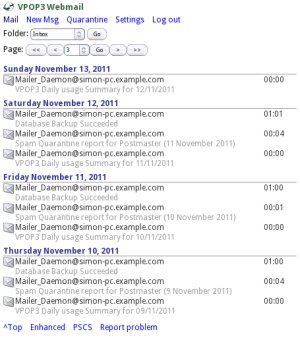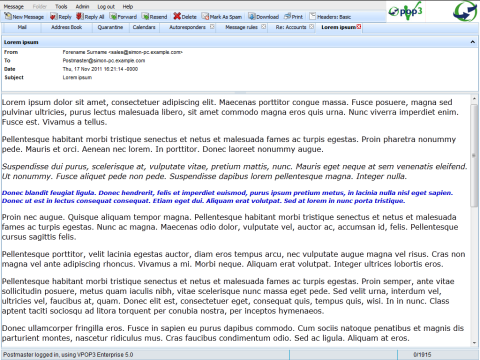Sidebar
Table of Contents
What's new in version 5 webmail?
This is a list of some of the most noticeable changes to VPOP3's webmail interface for version 5. For a more detailed list of changes, view our bugtracker.
Mobile compatible webmail
If you access version 5 webmail from a mobile device, you will probably be redirected to the mobile compatible version. It is a cut-down version of Webmail, which retains the key features, but doesn't utilise the extra features which work really well on a desktop, but may not necessarily work at all on a mobile device.
The mobile webmail will run on a desktop and can be used as a simple, low-feature alternative.
To access the mobile compatible webmail; on the login screen, select Use mobile compatible webmail.
To switch back from the mobile compatible version, just click the Enhanced link at any time.
We have done our best to automatically detect whether a device requires the mobile compatible version, or not; but due to the number of available devices, this may not have happened. If you think you are automatically sent to the wrong webmail version, go into the mobile compatible version, click Report problem and type details of the issue, either above or below the technical data; then send the message to support@pscs.co.uk .
Full-screen message previews
You can now open messages in a new webmail tab. This was quite a commonly requested feature and should be of most use to those with low screen resolutions. From the preview tab, you can also reduce the size of the message headers display, or hide it altogether.
You can open messages in three ways:
- Double-left-click the message
- Select the message(s) and click the Open button
- Select the message(s) and using the menu, select Messages → Open
Calendars
New to version 5, there is a calendar interface, which allows you to manage your calendars and events.
To access the Calendars tab, simply go to Tools → Calendars
Autoresponders
Autoresponders have been redesigned in version 5; and to complement this, there is an Autoresponders tab, which allows you to manage multiple autoresponders and the rules which trigger them.
To access the Autoresponders tab, simply go to Tools → Autoresponders
Message rules
Message rules are a powerful new feature in version 5. You can create rules to perform a range of actions, based on predefined criteria.
To access the Message rules tab, simply go to Tools → Message rules
Address Books
There have been several changes to the Address Books interface. See Address Book tab for further details.
Cookies
User interface customisations are now stored in cookies, which means that your web browser 'remembers' the changes you have made to things like the height/width of a panel, or the width of a column. This means that you have more power to configure the webmail layout to suit your requirements and your computer's screen size.
Download messages in .eml format
You can now download messages in an .eml format, which can then be viewed in an email client, such as Mozilla Thunderbird.
You can download messages in three ways:
- Select the message and click the Download button
- Select the message and using the menu, select Messages → Download
- Open the message and from the preview tab, click the Download button
Apply permissions to subfolders
It is now easier to edit permissions to an entire branch of folders. Previously, you would have needed to open each subfolder individually and apply the permissions.
Now, if the permissions are identical for a folder and each of its subfolders, you can just edit the parent folder and select Copy these settings to subfolders, upon save.
This applies a one-time copy of the settings and does not provide any future linking between the parent and child folder permissions.
Permissions will be inherited for each subsequent level; so changes made to the parent will be applied to the child and the child's children, and so on.
Add words to the spell checker dictionary
When using the spell checker, you can click Add word to add the selected word to the dictionary. The dictionary is user-specific, so there is no risk of a user adding unwanted words to someone else's dictionary.
Password strength indicator
When you change your password (Tools →Password), you now have a visual indicator which helps you choose a stronger password. The indicator isn't perfect - it doesn't recognise dictionary words and names, which are something you should always try to avoid - but it analyses the password in a scientific manner and gives a score, based on things like the inclusion of different types of character (capital letters, lower-case, numbers, symbols).
Message subject appears in tab title
When you have a tab open to create a new message, the tab is dynamically renamed to include the subject (or start of the subject, if it's too long). This makes it a lot easier to tell which tab to click on, when you are writing multiple messages at the same time.
Changes to the Settings screen
There are now a few extra configuration options in Tools → Settings, to accommodate this, the General and Folders tabs have been replaced with Messages and General tabs; this has enabled some of the settings to be moved around; hopefully in a way that you will find helpful.
The new settings are:
- Sort messages by: [ID (best performance) | Date]
- Refresh messages every: [number] seconds
- Prompt if opening: [number] or more tabs at once
The Autoresponder settings tab has been removed, because it is now obsolete.


